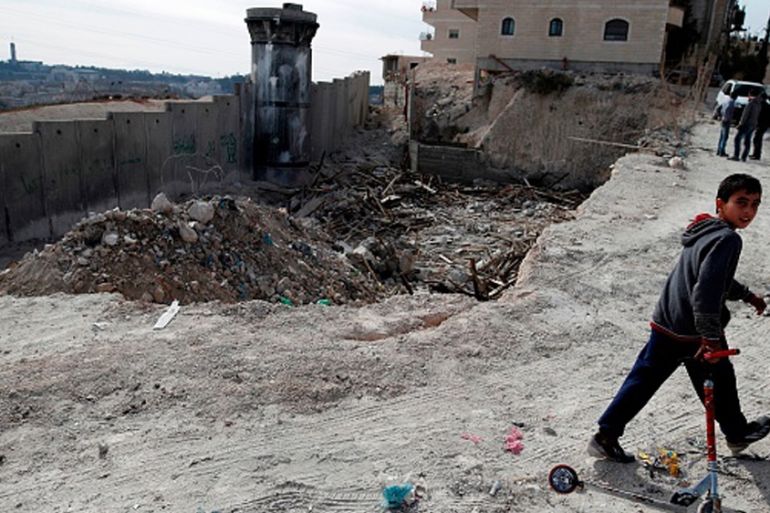Five ways Israeli law discriminates against Palestinians
More than 65 Israeli laws already exist that discriminate against Palestinians in Israel and the occupied territories.

While Israel passed a “nation-state” law that further marginalises Palestinian citizens, such legislation is nothing new.
There are currently more than 65 Israeli laws that discriminate against Palestinian citizens in Israel and Palestinian residents of the Occupied Palestinian Territories, according to Adalah, The Legal Center for Arab Minority Rights in Israel.
Keep reading
list of 4 itemsUS accuses Russia of using chemical weapons in Ukraine war
Russia-Ukraine war: List of key events, day 798
New Haiti PM tasked with stabilising violence-racked country
More than half of these laws were adopted since 2000. From 2009 to present, elections have brought to power the most right‐wing government coalitions in the history of Israel, led by Prime Minister Benjamin Netanyahu, Adalah noted.
Critics say Israel’s newest Jewish nation-state law passed on Thursday is just the latest effort to entrench ethnic superiority by promoting racist policies.
Adalah’s database shows how Israel’s laws – dating as far back as 1939 – discriminate against Palestinians.
Right to acquire, lease land
Basic Law: Israel Lands (1960) stipulates ownership of “Israel lands” – controlled by the state, Jewish National Fund (JNF) and the Development Authority – can only be transferred between the three entities, knowing that the JNF leases land it owns to Jews only.
|
|
Ninety-three percent of the land in Israel is public and belongs to the state, JNF, or the Development Authority. Thirteen percent is controlled by the JNF, which has a “hugely influential” role in Israeli land policies.
Palestinian citizens are blocked from leasing about 80 percent of the land controlled by the state according to Adalah.
Right to return
According to the Absentees’ Property Law (1950), Palestinian refugees expelled after November 29, 1947, are “absentees” and are denied any rights. Their land, houses/apartments, and bank accounts (movable and immovable property) were confiscated by the state.
Simultaneously, the Law of Return (1950) gave Jews from anywhere in the world the right to automatically become Israeli citizens.
Right to residency
For Palestinians who have a “permanent” residency status to live in Jerusalem, entry into and residency in Jerusalem is “a revocable privilege, instead of an inherent right”, according to human rights organisation Al- Haq.
Since 1967, nearly 15,000 Palestinians from East Jerusalem have had their residency rights revoked, according to the Interior Ministry.
Authorities justify most revocations on the basis of failing to prove that Jerusalem is their “centre of life”. If Palestinians are away from Jerusalem for a prolonged period of time, they can lose their residency rights.
The system pushes many Palestinians to leave their home city, amounting to forcible transfer, a violation of international law, according to Human Rights Watch.
In March 2018, Israel passed a law allowing the interior minister to revoke the residency rights of any Palestinian in Jerusalem on the grounds of a “breach of loyalty” to Israel.
In recent years, Israeli officials have revoked status to punish Palestinians accused of attacking Israelis, as well as their relatives as collective punishment.
The interior minister can strip the residency status of any Palestinian deemed to be a threat. These policies do not apply to the Jewish population.
Right to family life
The Ban on Family Unification – introduced as an emergency regulation in 2003 following the outbreak of the second Intifada in 2000 – prevents family unification when one spouse is an Israeli citizen and the other is a resident of the occupied territories.
Thousands of Palestinian families have been affected by the law, forced to split apart, move abroad, or live in Israel in fear of constant deportation.
Last June, Israel’s parliament renewed the ban as part of the Citizenship and Entry into Israel law for the 15th year, making it in effect a permanent law.
Right to commemorate Nakba
Palestinians traditionally mark Israel’s official Independence Day as Nakba Day, a day of mourning and commemoration marking the expulsion of more than 700,000 Palestinians in 1948 to make way for the creation of the state of Israel.
The Nakba Law introduced in 2011 allows the finance minister to reduce funding or support to an institution if it holds an activity that commemorates Israel’s Independence Day as a day of mourning.
“The law causes major harm to the principle of equality and the rights of Arab citizens to preserve their history and culture. The law deprives Arab citizens of their right to commemorate the Nabka, an integral part of their history,” Adalah wrote.